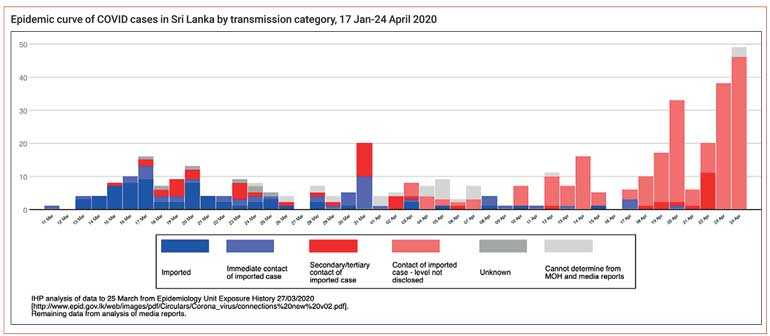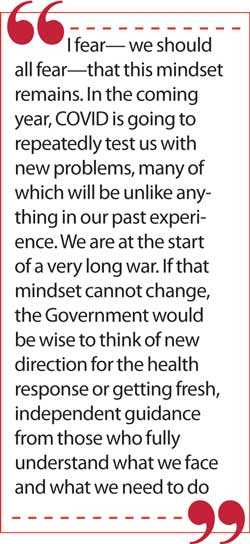Tuesday Feb 17, 2026
Tuesday Feb 17, 2026
Tuesday, 28 April 2020 00:00 - - {{hitsCtrl.values.hits}}

By Dr. Ravi Rannan-Eliya
Given what we know about the new cases detected in the past two weeks, it was no longer justifiable to relax COVID control measures on Monday (27 April), including lifting the curfew in Colombo. This is a monumental and totally avoidable policy failure and an unmitigated fiasco.
If accountability meant anything in this country, there would have been consequences for those involved in setting the health response. And to be absolutely clear, I do not mean the President, who has so far only acted in good faith on the advice he has been given.
When the Government imposed an island-wide curfew on the evening of 20 March, we only had 72 cases. Until that point, almost all were people who had acquired the infection overseas and returned before we stopped all incoming flights on 19 March. There were just a dozen other cases of local transmission, involving people in the community who had been infected directly or indirectly by a local arrival or foreign tourist.
The curfew should have had three clear objectives:
(1) To contain the virus to arrivals — This required screening all recent arrivals for infection and rapidly tracing and safely quarantining all cases and contacts of infected arrivals or any other cases to stop dead the spread of virus to others.
(2) To establish capacity and a system to rapidly detect, trace and isolate any cases of hidden infection in the community.
(3) To reduce social interaction so as to slow down person-to-person spread of any virus lurking in the population long enough for the first two objectives to be achieved.
We passed four weeks of lockdown on 17 April. In the subsequent 10 days we have had over 220 new cases. Almost all of these involve local transmission of the virus, as shown in shades of red in the chart below (blue indicates cases involving foreign arrivals or their immediate contacts).
Let me be clear what this means.
One, we have failed to contain the virus to arrivals and their immediate contacts. Other countries did this in four weeks, we did not.
Two, we have failed to establish the capacity to rapidly detect, trace and isolate new cases — Despite officials saying repeatedly that we have enough testing capacity, laboratory experts around the country are now scrambling to urgently expand what they can do.
In the past few weeks, several opportunities to acquire the large testing machines we need have been turned down. At the very minimum, we need capacity to do an average of 5,000-6,000 tests each day, and even with completion of a new test facility at Mulleriyawa, we will be well short. We also still lack a testing policy that is adequate to keep this country safe in the coming months – even the simplest measure such as mandating the testing of all ICU admissions has still not been done.
Three, we have failed to use the curfew to reduce the rate of person-to-person spread of the virus to a level where epidemic spread cannot occur. One or two infected cases in places as diverse as Colombo and the navy camp in Welisara have snowballed into major incidents.
If we lift the curfew now in the absence of adequate measures to educate the public in social distancing and basic hygiene measures, such as providing people with face masks, we face a significant risk that undetected cases in the community will rapidly spread the virus to others.
We need to maintain the lockdown for at least another two weeks, and maybe longer. Until such time that we are sure we have isolated the contacts of all known cases, and until we are sure that explosive undetected spread will not occur if the lockdown is lifted. Avoiding explosive spread in the absence of a lockdown requires rapid action to develop an action plan to achieve industrial scale testing, and stepped-up efforts to improve social distancing and public hygiene measures to keep us safe.
We can still do all of these things. What worries me is that it will not happen.
The hard truth is that we wasted the past month of lockdown and did not do what had to be done. It did not happen because of a lack of money, or because of unwillingness by the President, the military and our doctors, nurses and lab experts to do what they were told, or because the public was not willing to make sacrifices.
It is hard to avoid the conclusion that at the root of the failure was a mindset unable to rise to the urgency of the hour, to fully understand the challenge we face, and to think outside the box.
I fear— we should all fear—that this mindset remains. In the coming year, COVID is going to repeatedly test us with new problems, many of which will be unlike anything in our past experience. We are at the start of a very long war. If that mindset cannot change, the Government would be wise to think of new direction for the health response or getting fresh, independent guidance from those who fully understand what we face and what we need to do.
(Dr. Ravi P. Rannan-Eliya is Executive Director of the Institute for Health Policy. He trained as a physician at Cambridge, and obtained a doctoral degree in public health and economics at Harvard, where he was also a member of faculty at the Harvard T.H. Chan School of Public Health. The views and opinions expressed in this article are his personal views, more of which can be found at his blog site – ‘Personal Script’ at http://www.ihp.lk/blogs/ravi.)
Epidemic curve of COVID cases in Sri Lanka by transmission category, 17 Jan-24 April 2020